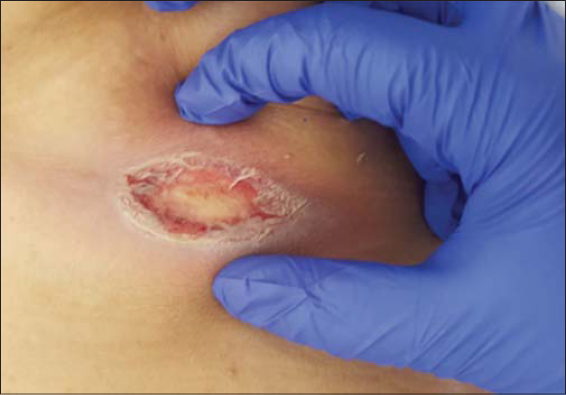A case of ecthyma gangrenosum in immunocompromised patient
Rhizlane Chaoui , Asmae Rasso, Selma El Kadiri, Zakia Douhi, Sara Elloudi, Hanane Baybay, Fatima Zahra Mernissi
, Asmae Rasso, Selma El Kadiri, Zakia Douhi, Sara Elloudi, Hanane Baybay, Fatima Zahra Mernissi
Department of Dermatology, University Hospital Hassan II, Fez, Morocco
Corresponding author: Dr. Rhizlane Chaoui
Submission: 19.04.2020; Acceptance: 23.06.2020
DOI: 10.7241/ourd.2020e.65
Cite this article: Chaoui R, Rasso A, El Kadiri S, Douhi Z, Elloudi S, Baybay H, Mernissi FZ. A case of ecthyma gangrenosum in immunocompromised patient. Our Dermatol Online. 2020;11(e):e65.1.
Citation tools:
Copyright information
© Our Dermatology Online 2020. No commercial re-use. See rights and permissions. Published by Our Dermatology Online.
A 80 -year-old female with pancytopenia from chemotherapy for Hodgkin lymphoma developed one week ago fever and a painless red maculeunder her left breast.
Physical exam revealed an ulcerating lesion with central necrosis, mesuring 4 cm in diametersurrounded by a halo of erythemaunder left breast (Fig. 1).
 |
Figure 1: Ulcerating lesion with central necrosis, mesuring 4 cm in diameter surrounded by a halo of erythema under left breast. |
The patient was started on broad-spectrum antibiotics. Blood and lesion cultures revealed Pseudomonas Aeruginosa confirming the diagnosis of ecthyma gangrenosum.The initial empirical treatment was switched to parenteral third generation cephalosporins.
Ecthyma gangrenosum (EG) is a rare skin infection classically associated with Pseudomona aeruginosabacteraemia.Clinically,it progresses sequentially from maculopapular lesion to haemorrhagic bulla and then to necroting ulcers surrounded by an erythematous halo.It usually affects immunocompromised patients (neutropaenia,hematological malignancies) and rarely occurs in immunocompetent subjects. The diagnosis is generally made based on the clinical appearance and evolution of the lesions along with a positive blood or wound cultures.
Antibiotic therapy with spectrum for Pseudomonas aeruginosa includes aminoglycosides, third- and fourth-generation cephalosporins, β-lactam antibiotics, and broad-spectrum penicillins.
Prognosis depends on the degree of immunosuppression and on the host.
Consent
The examination of the patient wasconductedaccording to the Declaration of Helsinki principles.
The authorscertifythatthey have obtained all appropriate patient consent forms. In the form the patient(s) has/have givenhis/her/their consent for his/her/their images and otherclinical information to bereported in the journal. The patients understandthattheirnames and initialswill not bepublished and due efforts willbe made to concealtheiridentity, but anonymitycannotbeguaranteed.
Notes
Source of Support: Nil,
Conflict of Interest: None declared.
Request permissions
If you wish to reuse any or all of this article please use the e-mail (brzezoo77@yahoo.com) to contact with publisher.
| Related Articles | Search Authors in |
|
 http://orcid.org/000-0003-3455-3810 http://orcid.org/000-0003-3455-3810 |



Comments are closed.